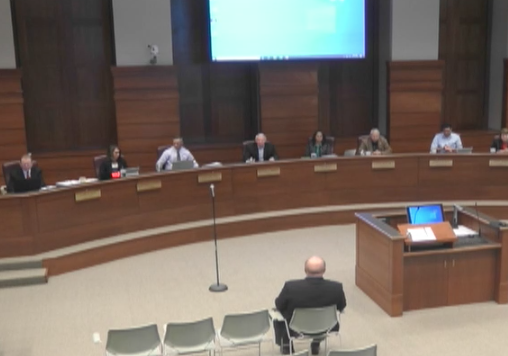MANHATTAN — The Manhattan City Commission will consider an amendment to Manhattan’s public nudity ordinance at Monday’s legislative meeting, according to a media release from the city.

First adopted in 2003, the existing ordinance makes it unlawful to publicly display female breasts or male or female buttocks or genitals. The ordinance contains exceptions from prosecution, including for breastfeeding mothers.
The proposed amendment removes the female breast from the definition of public nudity, in reaction to a court case that applies in Kansas. If the amendment is adopted, Manhattan’s public nudity ordinance will continue to prohibit the display of male or female buttocks or genitals in public. Even as amended, Manhattan’s public nudity ordinance will still be stricter than many areas of Kansas.
“The State of Kansas does not have a state law that prohibits general public nudity,” said City Attorney Katie Jackson. “To prohibit general public nudity within a city’s limits, the city must adopt an ordinance similar to Manhattan’s.”
Even with the amended ordinance, the City of Manhattan’s public nudity law will still be stricter than many smaller cities and unincorporated areas of Kansas, because Manhattan would still prohibit public display of female or male genitals or buttocks. However, it is still critical to understand that these communities are also subject to the same state and federal laws as Manhattan, and public nudity in these communities could be prosecuted if the facts violate state or federal law.
“Federal and state criminal laws apply throughout Kansas,” said Jackson. The facts may violate the “lewd and lascivious” state law, or if a minor is involved, child pornography or other sex offense laws. “If the facts surrounding a display of female toplessness violate a federal or state law, the offender can be prosecuted in federal or state court regardless of what a city ordinance says.”
Riley County Attorney Barry Wilkerson agreed. “Manhattan’s proposed change to its public nudity ordinance will not impair our ability to prosecute displays of public nudity or female toplessness that result in violations of state law.” The County Attorney’s Office also prosecutes offenses related to public nudity that occur in the unincorporated areas of Riley County. Unlike Manhattan, these areas have no local regulations prohibiting general public nudity.
The ordinance “decriminalizes” female toplessness, but only from the City’s ordinance. If the definition is changed, the City will not be able to prosecute a public display of female toplessness in the Manhattan Municipal Court. But this is not the same as “legalizing” female toplessness, which implies that a public display of female toplessness does not violate any law. Depending upon the facts, state or federal laws may be violated.
“A city ordinance amendment does not change state or federal law. Manhattan cannot legalize conduct that the federal or state laws make illegal,” said Jackson.
If the City Commission amends the ordinance on November 5, it retains the ability to amend it again in the future if the law changes or as issues arise. At first reading of the ordinance, the Commission noted that the ordinance can be revisited before the City’s swimming pools open. “This is an evolving area of the law, and we may have more guidance from federal or state courts in the next several months,” said Jackson.
A private business owner or organization may require a patron to wear a shirt or other clothing upon their private property. If a topless male or female enters the location, they can be asked to adhere to the dress code or leave, and be cited for criminal trespass if they refuse.
